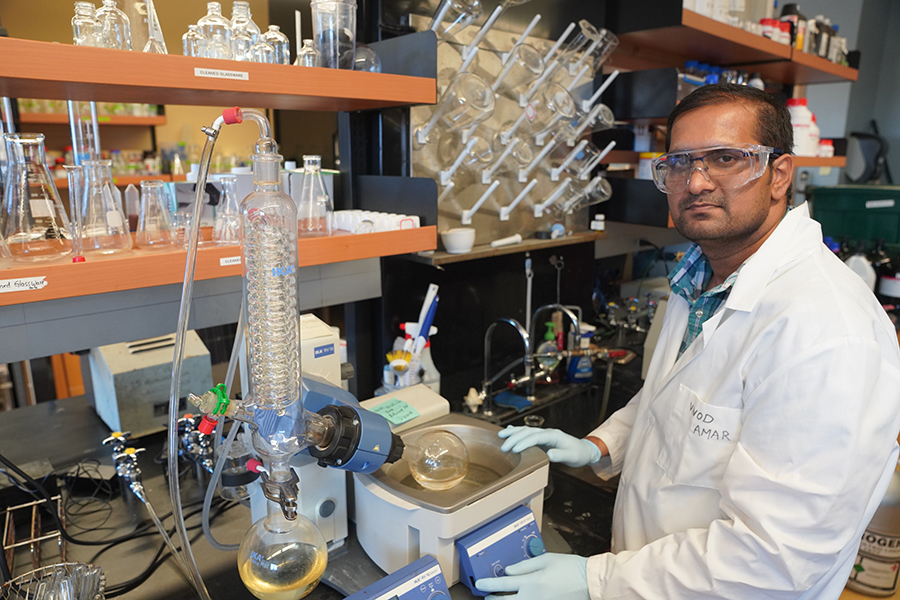SD Mines Researchers Pioneer New Methods

SD Mines Researchers Pioneer New Methods to Turn Biorefinery Waste into Valuable Products
RAPID CITY, SD (Nov. 19, 2019) — A research team at the South Dakota School of Mines & Technology is beginning work on pilot scale testing of new methods that turn biorefinery waste into valuable products. The waste biomass or byproducts generated by ethanol plants and other biorefineries, such as corn stover, are normally thrown-away—but finding cost-effective means of using this waste to make new products will generate extra revenue for the facilities, help lower fuel costs, reduce carbon emissions, and ultimately help farmers.
“This is one more way SD Mines is pioneering research that helps the environment while increasing efficiency and profit margins for our industry partners. This is the kind of work that can have a positive impact on the economy of South Dakota,” says SD Mines Vice President of Research Ralph Davis, Ph.D.
Rajesh Shende, Ph.D., professor in the chemical and biological engineering department at SD Mines is leading the research. This work began in Shende’s lab with a $2.16 million grant from the Department of Energy (DOE) Bioenergy Technologies Office that was awarded in 2017. This initial validation stage in the research proved successful; Shende’s team is now working on the effort to optimize processes at the laboratory level and scale up the work to prove it can work for industry.
“This is a great milestone in this project and we’re excited,” says Shende. “We had been doing something on a lab scale looking at a few grams at a time, we’re moving to processing one ton of per day.”
A pilot scale testing facility for one of the processes set to be established at SD Mines. Pilot scale processing of corn stover will be performed at Idaho National Lab, SD Mines and Southwest Research Institute (SwRI) to make products such as carbon nanofibers, lactic acid, phenol, and battery grade biocarbon. These valuable products have wide ranging use in industry, from disinfectants to carbon fiber materials to batteries and fuel. The products that can be created with these processes include clean-burning oils, “This can be blended with commercial bio-diesel and used in diesel generators,” says Vinod Amar, Ph.D., a SD Mines research scientist working on the project.
Some of the partnering institutions on this project will also have processing facilities including, Old Dominion University (ODU), Virginia Commonwealth University (VCU), Idaho National Laboratory (INL) and Southwest Research Institute (SwRI).
###
MEDIA CONTACT
Mike Ray
Communications Manager
SD Mines University Relations
Mike.Ray@sdsmt.edu
605-394-6082
About SD Mines
Founded in 1885, the South Dakota School of Mines & Technology is a science and engineering research university located in Rapid City, S.D., offering bachelor’s, master’s and doctoral degrees. The university enrolls 2,529 students with an average class size of 24. The SD School of Mines placement rate for graduates is 97 percent, with an average starting salary of more than $63,350.Find us online at www.sdsmt.edu.
 National Science Foundation RII Track-1 Project:Expanding Research, Education and Innovation in South Dakota
National Science Foundation RII Track-1 Project:Expanding Research, Education and Innovation in South Dakota